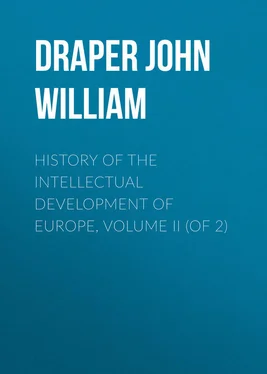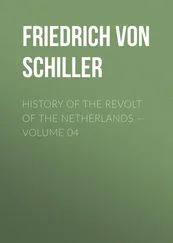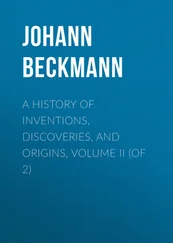John Draper - History of the Intellectual Development of Europe, Volume II (of 2)
Здесь есть возможность читать онлайн «John Draper - History of the Intellectual Development of Europe, Volume II (of 2)» — ознакомительный отрывок электронной книги совершенно бесплатно, а после прочтения отрывка купить полную версию. В некоторых случаях можно слушать аудио, скачать через торрент в формате fb2 и присутствует краткое содержание. Жанр: foreign_antique, foreign_prose, на английском языке. Описание произведения, (предисловие) а так же отзывы посетителей доступны на портале библиотеки ЛибКат.
- Название:History of the Intellectual Development of Europe, Volume II (of 2)
- Автор:
- Жанр:
- Год:неизвестен
- ISBN:нет данных
- Рейтинг книги:4 / 5. Голосов: 1
-
Избранное:Добавить в избранное
- Отзывы:
-
Ваша оценка:
- 80
- 1
- 2
- 3
- 4
- 5
History of the Intellectual Development of Europe, Volume II (of 2): краткое содержание, описание и аннотация
Предлагаем к чтению аннотацию, описание, краткое содержание или предисловие (зависит от того, что написал сам автор книги «History of the Intellectual Development of Europe, Volume II (of 2)»). Если вы не нашли необходимую информацию о книге — напишите в комментариях, мы постараемся отыскать её.
History of the Intellectual Development of Europe, Volume II (of 2) — читать онлайн ознакомительный отрывок
Ниже представлен текст книги, разбитый по страницам. Система сохранения места последней прочитанной страницы, позволяет с удобством читать онлайн бесплатно книгу «History of the Intellectual Development of Europe, Volume II (of 2)», без необходимости каждый раз заново искать на чём Вы остановились. Поставьте закладку, и сможете в любой момент перейти на страницу, на которой закончили чтение.
Интервал:
Закладка:
and disciplines him.For the count there remained nothing but to submit. He surrendered up his strong places, was compelled to acknowledge the crimes alleged against him, and the justice of his punishment. He swore that he would no longer protect heretics. Stripped naked to his middle, with a rope round his neck, he was led to the altar, and there scourged. But the immense army that had assembled was not to be satisfied by these inflictions on an individual, though the pope might be. They had come for blood and plunder, and blood and plunder they must have. Then followed such scenes of horror as the sun had never looked on before. The army was officered by Roman and French prelates; bishops were its generals, an archdeacon its engineer. Atrocities of the Crusaders in the South of France.It was the Abbot Arnold, the legate of the pope, who, at the capture of Beziers, was inquired of by a soldier, more merciful or more weary of murder than himself, how he should distinguish and save the Catholic from the heretic. "Kill them all," he exclaimed; "God will know his own." At the Church of St. Mary Magdalene 7000 persons were massacred, the infuriated Crusaders being excited to madness by the wicked assertion that these wretches had been guilty of the blasphemy of saying, in their merriment, "S. Mariam Magdalenam fuisse concubinam Christi." It was of no use for them to protest their innocence. In the town twenty thousand were slaughtered, and the place then fired, to be left a monument of papal vengeance. At the massacre of Lavaur 400 people were burned in one pile; it is remarked that "they made a wonderful blaze, and went to burn everlastingly in hell." Language has no powers to express the atrocities that took place at the capture of the different towns. Ecclesiastical vengeance rioted in luxury. The soil was steeped in the blood of men – the air polluted by their burning. Institution of the Inquisition.From the reek of murdered women, mutilated children, and ruined cities, the Inquisition, that infernal institution, arose. Its projectors intended it not only to put an end to public teaching, but even to private thought. In the midst of these awful events, Innocent was called to another tribunal to render his account. He died A.D. 1216.
Establishment of mendicant orders.It was during the pontificate of this great criminal that the mendicant orders were established. The course of ages had brought an unintelligibility into public worship. The old dialects had become obsolete; new languages were forming. Among those classes, daily increasing in number, whose minds were awakening, an earnest desire for instruction was arising. Multitudes were crowding to hear philosophical discourses in the universities, and heresy was spreading very fast. But it was far from being confined to the intelligent. The lower orders furnished heretics and fanatics too. To antagonize the labours of these zealots – who, if they had been permitted to go on unchecked, would quickly have disseminated their doctrines through all classes of society – the Dominican and Franciscan orders were founded. They were well adapted for their duty. It was their business to move among the people, preaching to them, in their own tongue, wherever an audience could be collected. The scandal under which the Church was labouring because of her wealth could not apply to these persons who lived by begging alms. Their function was not to secure their own salvation, but that of other men.
St. Dominic.St. Dominic was born A.D. 1170. His birth and life were adorned with the customary prodigies. Miracles and wonders were necessary for anything to make a sensation in the West. His was an immaculate conception, he was free from original sin. He was regarded as the adopted son of the Virgin; some were even disposed to assign him a higher dignity than that. He began his operations in Languedoc; but, as the prospect opened out before him, he removed from that unpromising region to Rome, the necessary centre of all such undertakings as his. Here he perfected his organization; instituted his friars, nuns, and tertiaries; and consolidated his pretensions by the working of many miracles. He exorcised three matrons, from whom Satan issued forth under the form of a great black cat, which ran up a bell-rope and vanished. A beautiful nun resolved to leave her convent. Happening to blow her nose, it dropped off into her handkerchief; but, at the fervent prayer of St. Dominic, it was replaced, and in gratitude, tempered by fear, she remained. St. Dominic could also raise the dead. Nevertheless, he died A.D. 1221, having worthily obtained the title of the burner and slayer of heretics. To him has been attributed the glory or the crime of being the inventor of "the Holy Inquisition." In a very few years his order boasted of nearly 500 monasteries, scattered over Europe, Asia, Africa.
St. Francis.St. Francis, the compeer of St. Dominic, was born A.D. 1182. His followers delighted to point out, as it would seem not without irreverence, a resemblance to the incidents that occurred at the birth of our Lord. A prophetess foretold it; he was born in a stable; angels sung forth peace and good-will in the air; one, under the form of Simeon, bore him to baptism. In early life he saw visions and became ecstatic. His father, Peter Bernardini, a respectable tradesman, endeavoured to restrain his eccentricities, at first by persuasion, but eventually more forcibly, appealing for assistance to the bishop, to prevent the young enthusiast from squandering his means in alms to the poor. On that functionary's gently remonstrating, and pointing out to Francis his filial obligations, he stripped himself naked before the people, exclaiming, "Peter Bernardini was my father; I have now but one Father, he that is in heaven." At this affecting renunciation of all earthly possessions and earthly ties, those present burst into tears, and the good bishop threw his own mantle over him. When a man has come to this pass, there is nothing he cannot accomplish.
Authorization of these orders.It is related that, when application was first made to Innocent to authorize the order, he refused; but, very soon recognizing the advantages that would accrue, he gave it his hearty patronage. So rapid was the increase, that in A.D. 1219 it numbered not fewer than five thousand brethren. It was founded on the principles of chastity, poverty, obedience. They were to live on alms, but never to receive money. After a life of devotion to the Church, St. Francis attained his reward, A.D. 1226. Two years previous to his death, by a miraculous intervention there were impressed on his person marks answering to the wounds on our Saviour. These were the celebrated stigmata. A black growth, like nails, issued forth from the palms of his hands and his feet; a wound from which blood and water distilled opened in his side. It is not to be wondered at that these prodigies met with general belief. This was the generation which received as inestimable relics, through Andrew of Hungary, the skulls of St. Stephen and St. Margaret, the hands of St. Bartholomew and St. Thomas, a slip of the rod of Aaron, and one of the water-pots of the marriage at Cana in Galilee.
Influence derived from these orders.The papal government quickly found the prodigious advantage arising from the institution of these mendicant orders. Vowed to poverty, living on alms, hosts of friars, begging and barefoot, pervaded all Europe, coming in contact, under the most favourable circumstances, with the lowest grades of society. They lived and moved among the populace, and yet were held sacred. The accusations of dissipation and luxury so forcibly urged against the regular clergy were altogether inapplicable to these rope-bound, starving fanatics. Through them the Italian government had possession of the ear of Europe. The pomp of worship in an unknown tongue, the gorgeous solemnities of the Church, were far more than compensated by the preaching of these missionaries, who held forth in the vernacular wherever an audience could be had. Among the early ones, some had been accustomed to a wandering life. Brother Pacificus, a disciple of St. Francis, had been a celebrated Trouvère. In truth, they not only warded off the present pressing danger, but through them the Church retained her hold on the labouring classes for several subsequent centuries. The pope might truly boast that the Poor Men of the Church were more than a match for the Poor Men of Lyons. Their influence began to diminish only when they abandoned their essential principles, joined in the common race for plunder, and became immensely rich.
Читать дальшеИнтервал:
Закладка:
Похожие книги на «History of the Intellectual Development of Europe, Volume II (of 2)»
Представляем Вашему вниманию похожие книги на «History of the Intellectual Development of Europe, Volume II (of 2)» списком для выбора. Мы отобрали схожую по названию и смыслу литературу в надежде предоставить читателям больше вариантов отыскать новые, интересные, ещё непрочитанные произведения.
Обсуждение, отзывы о книге «History of the Intellectual Development of Europe, Volume II (of 2)» и просто собственные мнения читателей. Оставьте ваши комментарии, напишите, что Вы думаете о произведении, его смысле или главных героях. Укажите что конкретно понравилось, а что нет, и почему Вы так считаете.












